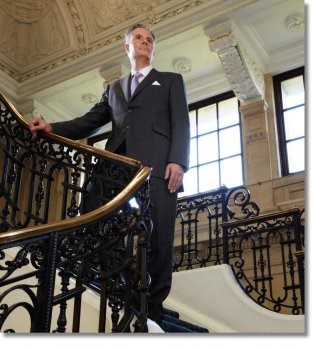
LESSON PLAN
From the security of teaching to the ever-changing world of corporate communications, Mark Bunker shares his journey with Andrew Thomas

Photographs by Jeff Leyshon
If a teacher’s role is to inspire, what inspires the teacher? For Mark Bunker, European communications director for global packaging firm Rexam, a chance meeting with a stranger at a party inspired him to give up teaching and enter the communications profession.
Bunker became a teacher straight after graduating in history at Royal Holloway, University of London in 1989. Teaching ran in the family, and he concedes it was less of a vocational calling and more a case of drifting into something he felt was a noble occupation. After qualifying at a prep school in Surrey he moved to a boarding school in Canterbury – seeking out the greater intellectual rigour of teaching GCSE and A levels.
It wasn’t enough. Gradually over the nine years he spent teaching, the insularity of the job and the lack of career progression that teaching in the private sector offered began to wear him down. “It was waiting for dead men’s shoes – it was widely accepted that you couldn’t be a head of a department until you were 35 and I baulked at that,” says Bunker.
These weren’t the only reasons. “The other factor was seeing some of the older teachers in the staff room, clearly burnt out, some even turning to alcohol. I did not want to end up looking like that. I realised if I was going to get out and do something different, I better do it while I was still young enough.”
He knew he wanted to leave but he didn’t know where he wanted to go. Teaching, particularly in a boarding school, is comparable to the army. His job provided his friends, his support structure, his accommodation. But unlike the army, there is no demob date in sight; no advice on what to do on the civvy street.
So how come communications? “It was purely by chance, to be honest. I met a chap at a party and, as people do at parties, the conversation turned to careers. I said I was an unhappy teacher, thinking of getting out, and he asked me if I had ever thought about corporate communications.”
The man at the party was Peter Waller, head of corporate communications at insurance firm Liverpool Victoria (now LV+). Waller was instrumental in inspiring Bunker to leave teaching and join Liverpool Victoria. “He spent the next eight months wooing me. I had already been thinking of moving on but it was a big step leaving something so safe. Teaching had encompassed my whole life – it was my family, my community.”
It wasn’t an easy transition. Not only had Bunker nowhere to live and no knowledge of the insurance world, he had no experience of working outside of education. “The hardest change for me was working with grown-ups,” he says. “The subtleties of working with adults and the complexities of the internal politics was the whole biggest learning curve. Teaching is very clear-cut – you know what you’ll cover for the whole year ahead. You’re locked into a routine, but there is very little routine in the comms world. Not everyone in an organisation is aligned.”
Bunker began to understand the intricacies of insurance, but doesn’t think sector understanding is important. “In the communications world I feel that our skills are fairly transferable. Yes, you have to learn a bit about the industry, but communications is communications.” Bunker know of what he speaks, “I have worked in insurance, banking, retail, food and now in manufacturing. I’ve never really overly focused on the industry, but on the communications challenges that the job has provided.”
Bunker’s position at Liverpool Victoria seems the ideal role for someone who, while starting out in comms, is mature enough to cope with responsibility. He handled both media relations and internal communications. “Probably my biggest learning curve was press handling. I was fortunate to learn from a senior press officer with 25 years’ experience. She made sure I was facing the right direction and gave me a chance to roll my sleeves and get the job done.”
Bunker thanks his teaching days for this ‘can do’ approach, “In teaching you have a set amount of time to achieve something. You can strategise all you like, but if someone is paying you to get things done then you’ve just got to get on and do it.”
Bunker was at Liverpool Victoria for nearly three years before moving on. The change was inspired by a familiar source, the man who pushed him into his first comms role, his boss and now mentor, Peter Waller. “Peter told me I’d learned all I can learn from Liverpool Victoria, it was time I went and experienced something else.”
Having left a safe and secure environment it was time to do so again. This time, however, there was little security. Bunker joined Burger King International at a time when the fast food industry was under attack. This was 2001 and mad cows, heart disease and teenage obesity dominated the headlines. “If something could be blamed on hamburger and chips, it was. But it was a great move to make. It was a step up into a much bigger brand and it gave me great experience in issues management, and even in consumer PR.”
|
Curriculum Vitae: Mark Bunker 2013 – present European communications director, Rexam |
Whilst Bunker benefited from the experience at Burger King, there’s a sense that he wasn’t completely happy there. When pushed he acknowledges that, culturally, the position wasn’t the best fit for him. He spent two years there, but when a head hunter surprised him with the chance of going to pub chain JD Wetherspoon as customer service and communications manager, he knew it was time for a change.
The Wetherspoon’s job again encompassed both internal and external comms but without the responsibility for media relations. It did include, however, responsibility for managing the customer services team. “What attracted me to Wetherspoon’s was that it was about managing people. I’d never had that responsibility before, so again it felt like the right kind of progression.”
Wetherspoon was built up by entrepreneur Tim Martin. Like other companies created and grown by a flamboyant character, much of the communication flows directly from that central figurehead. This in turn becomes cyclical as the press knows they get better copy from colourful CEOs. According to Bunker this can be great, but there are real challenges. “Sometimes the CEO can create headlines that organisations like Wetherspoon’s don’t always want.”
Ryanair and Virgin are companies that Bunker cites as similar, but quickly adds that there are great advantages with that kind of structure. “Tim wanted, and was very good at getting, people involved. He got them involved in the decision making and in doing so got them to support his ideas. In turn, they helped explain the ideas and initiatives to the customers.”
There’s a clear fondness in Bunker’s reminiscences of his days at Wetherspoon’s, but it is the shortest entry on his career resume. “I was made redundant” he says, adding “Wetherspoon’s had suffered a small dip. The decision was to take a layer out, and I and a number of others were that layer.”
By now Bunker had developed a well-rounded comms resume, that included internal communications, external communications, media relations and customers services. It was the latter that steered his next career move. In 2004 he moved to head comms for customer services function of retail chain Argos.
It was a big task; Argos had call centres throughout the UK, but Bunker had an understanding of the pressures of its employees. “Trying to communicate with employees who work on the phone day in, day out is a tough job, but their job isn’t easy either. A lot of the people doing these jobs aren’t well paid, they’re not in it for a career. They’re often students or mothers working around school hours. Companies are putting their reputation into the hands of those people and so it is so important to keep them on side and motivated. They have to feel part of an organisation, they have to feel valued. They need to pass it on to the customer.”
Twitter was born the year Bunker left Argos, but he doesn’t think that social media has changed the way most companies engage their internal audiences. “Most of the organisations outside of the tech sector have yet to get their heads around social media for internal comms. Large organisations are struggling with how to control it. The whole thing for internal and corporate internal comms is that people are trying to manage a message, and social media is not always the best enabler for organisations to do that.”
He adds, “Where there is great value in social media is in allowing project teams and groups to share their information and best practice on internal blogs and sharing spaces. I think that’s where it has the most value. Otherwise I’m not sure there is the kind of revolution that everyone talks about.”
Argos kept Bunker travelling the length and breadth of the country, visiting the retailer’s call centres in places like Widnes and Stafford, for three-and-a-half years. He actively sought his next step, when the position of senior communications manager came up at Lloyds TSB. It was January 2008, and no one could forecast how much the job was to change in Bunker’s first year.
Bunker still sounds shocked when he recounts his time in the banking sector, “When I joined Lloyds it had a good reputation for benefits and looking after its employees, it embraced diversity. All the sorts of things that gave a company a good reputation. But eight or nine months later, not just Lloyds, but the whole industry was thrown into turmoil.”
The crisis hit Lloyds particularly hard. Bunker was there for two years, but says it felt more like four or five. “There were times when it was incredibly tough. Morale plummeted. Many employees had bought shares but it was more that people had invested their careers in the company. The crisis didn’t just affect that organisation, but the whole financial services industry, and people who worked in banking were seen as enemy number one.”
It was the speed of change during the height of the crisis that became one of the biggest challenges for comms professionals. With his colleagues, Bunker learned of Lloyds takeover of HBOS not from the bank, but from Robert Peston on the BBC. “The news agenda worked at a frightening pace. But I look back on it now and I am genuinely glad I was there. I learned a huge amount about crisis management. I don’t believe I will work anywhere else where such a cataclysmic event would happen, and I’d have to deal with it.”
His advice to anyone caught in a similar situation is to keep calm and not overreact, “I think you have to take stock and keep your employees as well informed as you can. Being truthful with them is vital.”
Bunker helped with the comms challenge of merging the two organisations but when the option of redundancy was offered he willingly took it. “Those two years taught me so much, but ultimately it confirmed my thoughts that banking was not the right place for me.”
Bunker went to Rexam in June 2010 as sector communications manager and was promoted to sector communications director (effectively European communications director) in May of this year.
It seems like he’s found happiness at Rexam, already the longest date span in his career history. “When I look back at my career, and how I fell into teaching, I’ve been playing catchup ever since. But I can really say at Rexam I’ve found somewhere I feel at home.”




